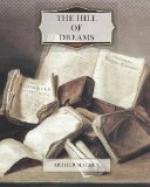“What a pretty text,” said Miss Deacon. “I should like to nail it up in my room. Why don’t you try to do something like that, Lucian? You might make something by it.”
“I sent them these,” said Lucian, “but they don’t like them much.”
“My dear boy! I should think not! Like them! What were you thinking of to draw those queer stiff flowers all round the border? Roses? They don’t look like roses at all events. Where do you get such ideas from?”
“But the design is appropriate; look at the words.”
“My dear Lucian, I can’t read the words; it’s such a queer old-fashioned writing. Look how plain that text is; one can see what it’s about. And this other one; I can’t make it out at all.”
“It’s a Latin hymn.”
“A Latin hymn? Is it a Protestant hymn? I may be old-fashioned, but Hymns Ancient and Modern is quite good enough for me. This is the music, I suppose? But, my dear boy, there are only four lines, and who ever heard of notes shaped like that: you have made some square and some diamond-shape? Why didn’t you look in your poor mother’s old music? It’s in the ottoman in the drawing-room. I could have shown you how to make the notes; there are crotchets, you know, and quavers.”
Miss Deacon laid down the illuminated Urbs Beata in despair; she felt convinced that her cousin was “next door to an idiot.”
And he went out into the garden and raged behind a hedge. He broke two flower-pots and hit an apple-tree very hard with his stick, and then, feeling more calm, wondered what was the use in trying to do anything. He would not have put the thought into words, but in his heart he was aggrieved that his cousin liked the pigeons and the text, and did not like his emblematical roses and the Latin hymn. He knew he had taken




